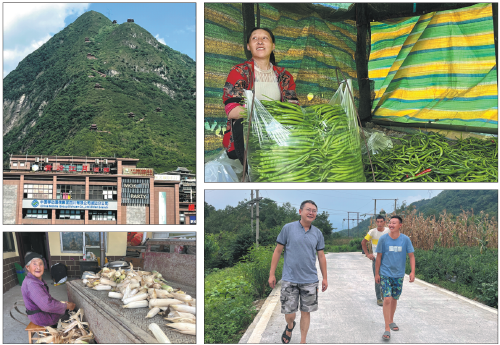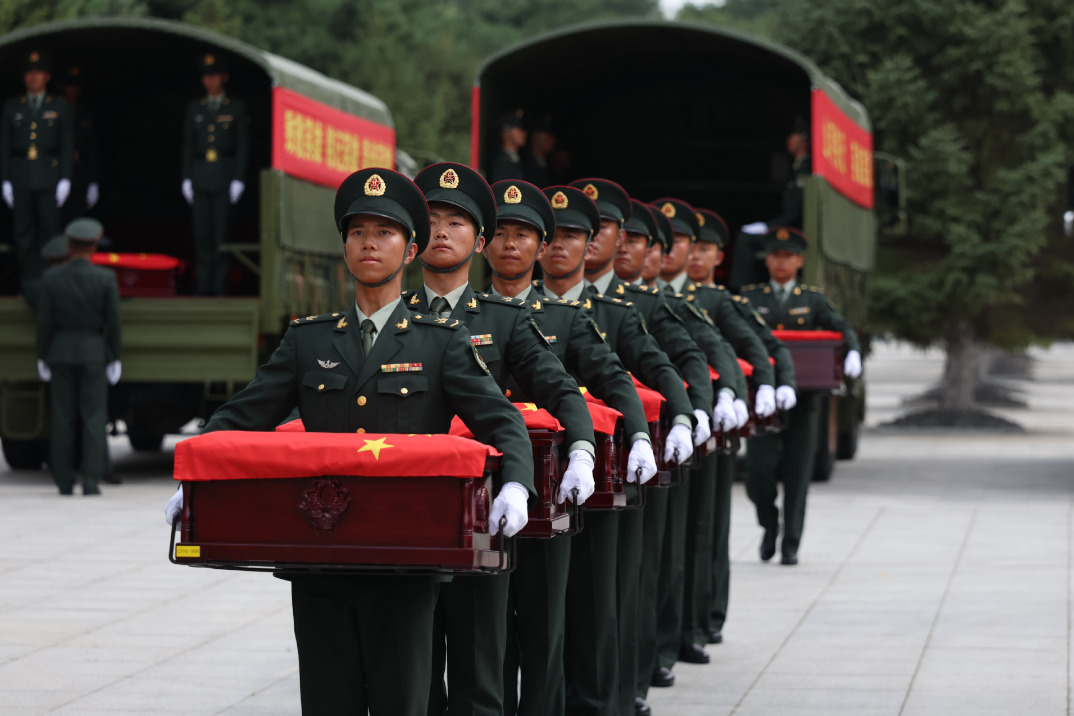Cadres find meaning in their work among villagers
Bank employees take break from routine jobs to support vitalization project in remote Sichuan community

On Monday mornings, Zhao Lingfeng embarks on a journey from his home in Chengdu, Sichuan province, boarding a high-speed train bound for Leshan, a city nearly 150 kilometers to the south, together with his colleague Hu Jianyong.
Upon arrival at the Leshan railway station, they meet their local colleague, Shui Wei. Shui drives the other two for another 90 km to Yangziyan village in Ebian Yi autonomous county, which is under the administration of Leshan.
The three stay and work in the mountain village until Fridays, when they head back home.
They are cadres sent to the remote community to support its rural vitalization effort. Shui, an official with the Leshan Intermediate People's Court, is the first Party secretary of the village and the team leader.
After working for more than one year in the village, Zhao, 50, an employee of Bank of Communications' Sichuan branch, has become familiar with his new routines and started enjoying his country life.
Zhao applied to join the bank's rural vitalization project in Ebian because he wanted to experience something different from his routine banking work.
"The work as a grassroots cadre is also challenging," he told China Daily, "but in ways that are totally different from my previous work."
Adapting to country life
According to the village official, the Bank of Communications' Sichuan branch launched its targeted poverty alleviation project in Ebian in 2015, and it has evolved into a rural vitalization campaign since 2021. Collaborating closely with the Leshan court, they have directed their efforts toward supporting Yangziyan, a beautiful community nestled atop Mount Beifeng, offering a panoramic view of Ebian's county seat.
Significant improvements have been made, including the construction of cement roads leading to the villagers' residences, the establishment of a library, as well as the installation of solar-powered streetlights.
Zhao said that the bank also donated two drones for agricultural purposes, enhancing farming practices in the village. These initiatives have not only enhanced the overall infrastructure but have also uplifted the living standards of the residents. As a result, Yangziyan has undergone a remarkable transformation and was listed as a model village by Leshan this year.
Zhao and Hu constitute the bank's second team dispatched to the village. Upon their arrival in July last year, their colleagues from the first team were still there.
The living quarters arranged by the bank within a villager's home were still occupied by their predecessors, Zhao said, so the two had to seek lodging at a tiny inn in Xinchang township, situated about 8 km from the village and adjacent to a busy highway.
"Heavy trucks ferrying sand from the Dadu River or transporting agricultural products ran in an endless stream along the road throughout the night," Zhao said.
"In the first week of our arrival, the incessant rumble of trucks made it challenging to secure a moment of undisturbed rest."
After they moved into the villager's home, Zhao and Hu initially opted to pay for meals and dine with their host family. However, as they settled into their new living arrangements, they soon realized that figuring out the logistics of organizing their three daily meals would become an ongoing challenge and a persistent source of concern. "Farmers here can hardly dine on time," Zhao said. "It's a situation that is truly difficult to adjust for we urban residents."
In the midst of the bustling seasons, he said, the villagers typically leave their homes as early as 5 am, often skipping breakfast, simply carrying provisions to the fields. They return home to prepare and have their midday meal between 1 pm and 2 pm, while dinner time ranges from 8 pm to 10 pm.
In December, they moved into the village Party secretary Guo Wengui's new house and their living conditions have become much better.
However, Guo is very busy with his management work in the community and his wife must tend their fields by herself.
The three figured out a new way to organize their meals. Now each of them will prepare breakfast and dinner for themselves. At noon, they will drive to Xinchang township together and share a meal at a restaurant. "My breakfast is two boiled eggs and a carton of milk," Zhao said. "Dinner is either instant noodles or porridge cooked in a rice cooker."
Zhao leaves his own car at the village, but sometimes will drive it to attend meetings or training sessions held at the county seat of Ebian, which is more than 30 km away.
He and Hu each bought a motorcycle for their daily commute in the community.
Rural business
In addition to acclimatizing to rural living, the greater challenge for them lay in adjusting to the work dynamics and content, Zhao said.
"It often takes a day for a meeting at the county seat and half a day for a meeting at the township," Hu said. "I spent a lot of time adjusting to the pace of work here."
According to Guo, the village consists of 277 households, totaling 866 residents, organized into three groups within the community. Each of the three cadres is responsible for focusing on one group.
Zhao's work centers around the third group comprising 68 households totaling about 280 individuals. He mentioned spending several months familiarizing himself with each remaining resident, acknowledging that more than half have migrated to cities in pursuit of employment opportunities.
After establishing rapport with the villagers, Zhao discovered that he had been perceived as "the representative from the superior department" and someone they could genuinely depend on. They began approaching him for assistance with various issues, ranging from disputes with neighbors concerning water usage and farmland allocation to family conflicts. "Sometimes I could offer advice," he said. "More often than not, I can only listen to their concerns with patience."
Zhao has successfully forged friendships with several villagers, particularly among the younger generation. He has earned the endearing title of "honorary grandpa" to a three-year-old boy, courtesy of his close friendship with the boy's father, Zhou Wei. At 25, Zhou is the same age as Zhao's daughter.
Zhou is one of the few young villagers who have decided to stay at home instead of finding work in a city. Since 2022, he has been raising pigs in the village, and his farm now has about 80 pigs. "If the price of pork (22 yuan or $3.12) per kilogram remains stable this year, he might have a decent income in the next one or two years," Zhao said.
Zhou's wife takes care of their son at a rented apartment in Emeishan city, over one hour's drive from the village. "If the income from pig farming is not good enough, he will leave the village for better work," Zhao said.
The biggest challenge
This year, because of the good price of green chile pepper, one of the major crops planted in the area, many young people have returned home to help with harvesting.
The pepper harvesting season typically spans from July to October, Zhao said. "The labor-intensive process of picking, sorting and packing the chile peppers keeps the villagers occupied from dawn until dusk," he said.
From the morning hours until late noon, he said, two or three people can harvest 200 to 250 kg of fresh chile. Following a brief lunch break, women in each family diligently sort and pack the vegetables into uniform plastic bags. "It's essential to pack the peppers neatly," Zhao said. "Each bag holds about 25 kg of peppers, currently priced at 5.4 yuan per kg. At the season's onset, prices soared to as high as 8 yuan per kg."
As evening descends, traders arrive in trucks along the road, purchasing the villagers' yields one household at a time. As a result, a day's worth of strenuous effort yields a family an income of more than 1,000 yuan.
However, he said, the prices plummeted to a mere 1 yuan per kg the previous year. "The drastic drop in prices led to a situation where the villagers were hesitant to even harvest the peppers," he said.
Despite the village's per capita income surging from a meager 9,000 yuan in 2018 to over 17,000 yuan last year, Guo said, the income from working in cities continues to surpass that from agricultural activities. This discrepancy persists due to the volatile nature of agricultural product prices.
Zhao said the bank has extended loans exceeding 100 million yuan to enterprises in Ebian, contributed over 1 million yuan to rural initiatives in the county, and purchased agricultural products totaling 3.7 million yuan from the county since 2021.
However, to make young people stay in the village, he said, they still need to explore alternative ways for sustainable community development beyond agriculture. "It's truly the biggest challenge we have faced since our arrival," he said.
They tried rural tourism at the village and suggested Guo turn his mother's new house, a three-story building beside his house, into a homestay with a dozen guest rooms. Earlier this month it received its first group of customers. "They came to enjoy the cooler air in the mountains," Zhao said.
A stone stairway constructed on the mountainside links the county seat with the village. Zhao said that the bank is planning to build a cultural plaza and scenic lookout for the village to help it attract visitors. As a result, he is thinking of staying in the village for two more years after his official term ends next year.

Today's Top News
- Martyrs' remains return to homeland
- Forum eyes world peace and stability
- FM urges US to 'exercise prudence in words, deeds'
- Large lenders go all in on tech finance
- Nation's righteous path in the WWII fight against fascism
- CNS Fujian heads for South China Sea for scientific research tests, training missions






























